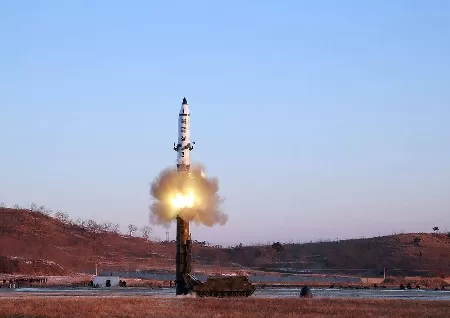North Korea dispatches numerous missiles, setting off alarms in Japan and South Korea

North Korea kept up its concentrated sending off of missiles, terminating three additional on Thursday in the wake of setting a record the earlier day with 23 send-offs.
The shots, including a thought intercontinental long range rocket, have set off cautions, provoking a few occupants to look for cover in two nations - South Korea and Japan - on the two days.
Japan's State leader Fumio Kishida called the send-offs "painful." Japan's administration at first gave a caution for three prefectures, saying the ICBM had flown over the fundamental island of Honshu, however later adjusted the proclamation. North Korea last terminated a moderate reach rocket over Japan on Oct. 4.
"North Korea organized an exceptionally undermining incitement at an extent we've never seen," says Kim Jeong-dae, a previous protection official and visiting teacher at Yonsei College in Seoul.
"First, they launched missiles from all around the country — east, west, south, north," he explains. "This seems intended to negate our strategy of striking the source of attack." He adds that the quantity of projectiles suggests that North Korea has produced ample stockpiles of weapons.
Wednesday's launches marked the first time a North Korean missile had flown over the de facto maritime border separating the two Koreas since the Korean War ended in an armistice in 1953. One flew toward Ulleung Island off South Korea's east coast, triggering air raid sirens, before dropping in the sea.
While missiles didn't land in South Korea's regional waters, South Korean President Yoon Suk Yeol referred to the send off as "equivalent to abusing A south Korea's area." South Korea answered by terminating two air-to-ground missiles across the oceanic line into worldwide waters.
Sending off them so near South Korean region, Kim Jeong-dae says, should have been visible as a sort of "region refusal system that impedes the consolidated powers [of the U.S. what's more, South Korea] from moving toward North Korea."
"Furthermore, the locale where the North Korean rocket fell," he adds, "has many fishing boats getting squid," proposing that it could endanger South Koreans' livelihoods, and "posture existential danger to South Korea, assuming need be."
North Korea has denounced the U.S. of planning to go after it, potentially with atomic weapons, to legitimize its rocket dispatches.
Pyongyang focuses to the current week's U.S.- South Korean joint aviation based armed forces drills, including exactly 240 military airplane flying a record of around 1,600 forays.
Last week, it highlighted 12 days of "Public Guard" field works out. While the partners demand the drills are protective in nature, they are pointed toward overcoming dangers from North Korea.
Pyongyang has smoldered at the U.S. sending of "vital resources, for example, plane carrying warships and atomic controlled submarines to the region around the Korean landmass to deflect and answer North Korean incitements. Pyongyang has called the organizations a danger to provincial soundness.
Also, it particularly shudders at U.S. also, South Korean military activities that recreate "beheading" strikes against North Korea's initiative.
Obviously, even without the affection of U.S. also, South Korean military activities, North Korea is probably going to test numerous atomic weapons and missiles into the indefinite future.
It's a piece of a five-year intend to expand its atomic and rocket weapons stores, in order to drive the U.S. to make concessions, for example, sanctions help and acknowledgment of Pyongyang as an atomic weapons state. Washington demands these won't occur.
As sensational as the current week's tactical muscle flexing may appear, North Korea has allegedly finished arrangements to finish it off with the test-explosion of a nuclear bomb, in the event that it so decides. While this has been anticipated for a really long time, Pyongyang might imagine that timing it to match with U.S. midterm decisions would yield extra political effect.
Related queries to this article
- north korea
- dispatches
- numerous
- missiles
- japan
- south korea
Read more articles and stories on InstaSity Latest News.


